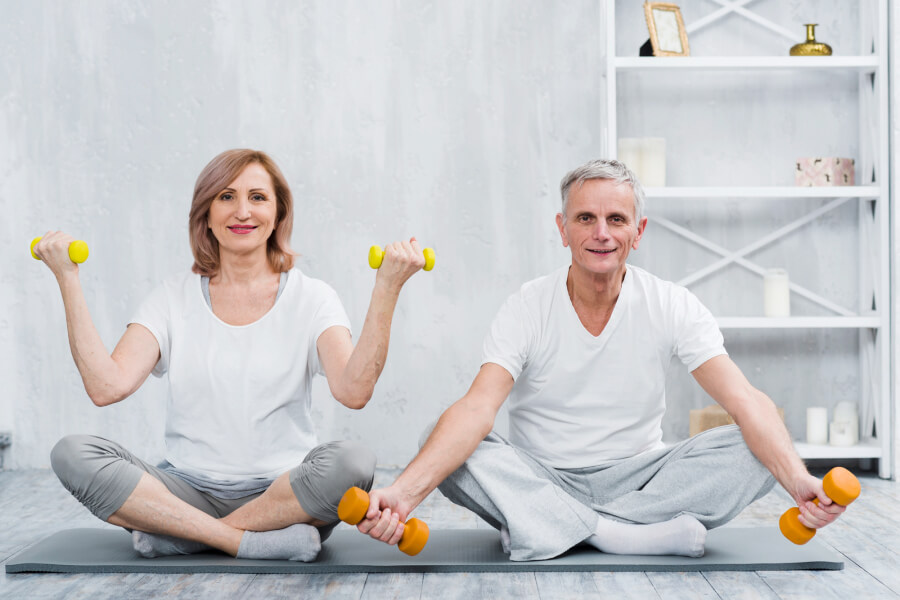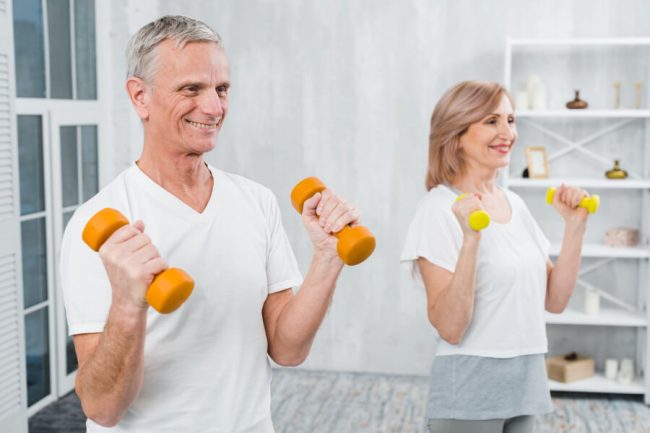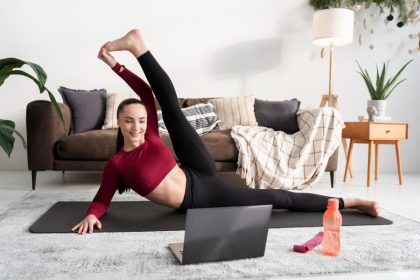Moderate an active lifestyle for older adults helps to maintain a good quality of life.
This guide on fitness tips for seniors at home will provide practical advice on how to begin a fitness regimen tailored to the needs of older adults.
The Centers for Disease Control and Prevention suggests an amount of time range from 20-15 mins every day generally fit aged 65 and older of exercise two or more times a day.
Who Should Take These Exercises?
This fitness guide is specifically tailored for older adults aged 60 and above. Whether you’re just starting or looking to motivate yourself for some fitness tips for seniors at home, these exercises is safe and effective for senior adults, helping to strengthen muscles, improve balance, and boost overall health.
10-Minute Strength Routine
Strength training is essential for maintaining muscle mass and bone density, especially as we age.
Here’s a simple 10-minute strength routine that can be done at home without any special equipment:
Chair Squats: Stand in front of a sturdy chair, feet shoulder-width apart. Lower yourself as if sitting, then stand back up. Repeat for 10-15 repetitions.
Wall Push-Ups: Stand facing a wall, place your hands on the wall at shoulder height and width. Bend your elbows to lean towards the wall, then push back to the starting position. Repeat for 10-15 repetitions.
Leg Lifts: Sit on a chair with your back straight. Lift one leg straight out in front of you, hold for a few seconds, then lower. Repeat with the other leg. Do 10-15 repetitions on each side.
Bicep Curls: Use light dumbbells or household items like water bottles. Sit or stand with a weight in each hand, arms at your sides. Curl your hands towards your shoulders, then lower. Repeat for 10-15 repetitions.
Diet and Health Food to Help Maintain a Good Physique
Maintaining a good physique involves more than just exercise; it also requires a balanced diet rich in nutrients. Here are some key dietary tips to support your fitness journey:
Protein-Rich Foods: Essential for muscle repair and growth. Include lean meats, fish, eggs, beans, and legumes in your diet.
Whole Grains: Provide sustained energy. Opt for whole-grain bread, oatmeal, brown rice, and quinoa.
Fruits and Vegetables: Packed with vitamins, minerals, and antioxidants, they help in overall body maintenance and recovery.
Healthy Fats: Include sources like avocados, nuts, seeds, and olive oil to support heart health and overall well-being.
Hydration: Stay hydrated by drinking plenty of water throughout the day, especially when exercising.
Walking and Routine: Exercises for Seniors to Do at Home
Walking is one of the most accessible and beneficial exercises for seniors. It improves cardiovascular health, helps with weight management, and enhances mental well-being. Here are some tips for incorporating walking and other home-friendly exercises into your routine:
Daily Walks: Aim for a 30-minute walk each day. If this seems too much, start with shorter walks and gradually increase the duration as your stamina improves.
Indoor Walking: If the weather is not conducive, consider walking around your house or apartment. You can also walk in place while watching TV.
Stair Climbing: If you have stairs at home, use them for a brief cardio workout. Climb up and down at a comfortable pace for 5-10 minutes.
Seated Marching: Sit on a sturdy chair and march in place, lifting your knees high. This can be a good option for those with limited mobility.
Stretching Routine: Incorporate stretches to maintain flexibility and reduce muscle stiffness. Focus on major muscle groups, and hold each stretch for 15-30 seconds.
The Importance of Fitness in Older Adults
Improve cardiovascular health: Activities like walking, swimming, and cycling strengthen the heart and improve circulation, reducing the risk of heart disease.
Increase strength and muscle mass: Strength training exercises help maintain muscle mass, which naturally decreases with age, and improves bone density, reducing the risk of osteoporosis.
Enhance flexibility and balance: Stretching and balance exercises, such as tai chi, improve mobility and reduce the risk of falls, a common concern for seniors.
Manage weight: Staying active helps control weight, reducing the risk of obesity-related conditions like diabetes and high blood pressure.
Mental Well-Being and Exercise
Reduce symptoms of anxiety and depression: Exercise releases endorphins, which are natural mood lifters.
Improve cognitive function: Engaging in physical activity helps maintain brain health and can improve memory and attention.
Enhance sleep quality: Regular exercise promotes better sleep, which is often disrupted in older adults.
Conclusion
These fitness tips for seniors at home is a powerful step toward better health and well-being in older age.
By following these fitness tips for seniors at home, you can enhance your physical health, boost your mental well-being, and improve your overall quality of life.
Remember, it’s never too late to start exercising, and every step you take towards a more active lifestyle is a step towards a healthier, happier you.
FAQs
How should a 70-year-old start exercising?
Starting slowly is key. Begin with low-impact activities such as walking, swimming, or tai chi. Incorporate strength training exercises with light weights or resistance bands. Always consult a healthcare provider before starting a new exercise program.
What is the most beneficial exercise for seniors?
Walking is often considered one of the best exercises for seniors due to its accessibility and benefits for cardiovascular health, weight management, and mental well-being.
What are the guidelines for senior fitness?
The general guidelines for fitness tips for seniors at home include at least 150 minutes of moderate aerobic activity per week, strength training exercises twice a week, and flexibility and balance exercises regularly. Always consider individual health conditions and fitness levels when designing an exercise program.
How to stay fit after 70?
To stay fit after 70, incorporate a mix of aerobic, strength, flexibility, and balance exercises into your routine. Stay consistent, choose activities you enjoy, and focus on maintaining a healthy diet and lifestyle. Social support and setting realistic goals can also help maintain motivation and consistency.







